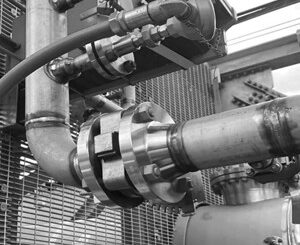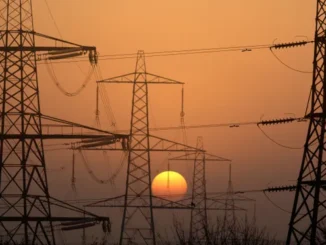
By Richard W. Fulmer — September 21, 2022
“In its Ahab-like focus on harpooning ExxonMobil, the BBC missed an opportunity to explore the enormous challenges involved in replacing fossil fuels. The costs of ignoring those challenges may well be tragically put on display this winter when Europeans face freezing temperatures with nothing but BBC-approved power systems to keep them warm.”
In Episodes 1 and 2 of its three-part documentary, Big Oil vs The World, the BBC succeeded only in demonstrating its own bias. Time and again, viewers were presented with only one side of a many-sided issue. Episode 3 is no exception. This episode’s main narrative is that, for years, oil companies have touted natural gas as a clean alternative to coal, but poor execution has largely offset the benefits.
Per unit of energy generated, natural gas produces about half the carbon dioxide of coal. However, methane – the main component of natural gas – is itself a greenhouse gas. In fact, methane can trap more heat (20 to 80 times more, depending upon the chosen timescale) than carbon dioxide, although the damage that it does is limited by its relatively short life in the atmosphere (twelve years vs centuries).
Gas leaks – from wells, pipelines, and refineries – are releasing large amounts of methane around the world. Worse is the claim by Dr. Dar-Lon Chang, an engineer who worked for ExxonMobil from 2003 – 2019, that “There wasn’t much appetite for management to measure methane leakage because, if they found out there was a problem, they would have to do something about it.”
In the face of industry opposition, the Obama Administration tightened gas leakage regulations, but Trump reversed White House policy when he took office (testimony to the problems inherent in rule by executive order).
What the BBC Left Out
Methane Emission Sources. According to the International Energy Agency (IEA), wetlands are the main global source of methane emissions. Agriculture is the largest source of human emissions followed closely by energy production. Energy emissions can be separated into (in order of descending volumes): natural gas production, coal, oil, and biofuels. Waste emissions, including those from landfills, rank fourth, though they surpass those emitted from any of the four separate energy sources.
The Need for Natural Gas. Because governments around the world have mandated the use of intermittent power sources such as wind and solar, backup generation that can come online quickly is essential for those times when the wind dies or a cloud blocks the sun. By far the most used backups are gas turbines. They are energy efficient, inexpensive to build, and have small footprints making them easy to site. As the IEA states:
Oil and natural gas will be part of the energy system for decades to come – even under ambitious efforts to reduce greenhouse gas emissions in line with the Paris Agreement.
Infrastructure. According to the IEA:
In many cases, captured gas can be easily brought to market. However, in other cases, particularly where gas is co‑produced (or “associated”) with oil, existing pathways or businesses may not exist to bring the gas to productive use. In these cases, it may be necessary to construct new infrastructure to bring the gas to a consumer, including new compression equipment, gathering pipelines and transmission pipelines, or liquefaction facilities. Methane abatement may falter without policies that require or incentivise productive use of natural gas.
Blocking pipeline and LNG facility construction results in stranded gas that is either flared or, worse, simply released.
Improvements in U.S. Production Practices. According to a 2019 peer-reviewed study published in Geophysical Research Letters:
In the past decade, natural gas production in the United States has increased by ~46%…. Based on long‐term and well‐calibrated measurements, we find that (i) there is no large increase of total methane emissions in the United States in the past decade; (ii) there is a modest increase in oil and gas methane emissions, but this increase is much lower than some previous studies suggest; and (iii) the assumption of a time‐constant relationship between methane and ethane emissions has resulted in major overestimation of an oil and gas emissions trend in some previous studies.
In other words, emissions per unit of gas produced have fallen significantly. But ExxonMobil is by far the nation’s largest natural gas producer, accounting for 50% more production than its nearest competitor. So, how can Chang’s claims that the company ignores its gas leaks be true if emission rates are dropping?
Regulation. In June 2021, Congress reinstated methane emissions regulations, so no future President can eliminate them by fiat. In addition, both methane and CO2 emissions can now be detected from space. Satellites have identified methane leaks from various sources around the world, including farms, landfills, oil and gas operations, and coal mines.
While Congress can regulate the U.S. oil and gas industry, it cannot control emissions in countries such as Russia, Iran, China, and Turkmenistan. Banning natural gas production in the U.S. would enable nations with poor environmental records to produce – and emit – more. As I observed in my review of Episode 1, “emit more elsewhere” is not an effective policy.
Wind Turbine Whitewash
The BBC did an even worse job in interviewing renewable energy entrepreneur, Patrick Woodson. If its journalist asked Mr. Woodson any probing questions, they were left on the cutting room floor. Woodson was allowed to leave viewers with the impression that wind power is a complete alternative to fossil fuels. Left unmentioned is that wind turbines require backup because they work only when the wind blows.
Most conventional power generators such as coal and nuclear plants cannot be fired up quickly. They all generate steam that is used to drive turbines. But bringing water to a boil takes time and, unless such facilities are already up and running, they cannot be used as backup for intermittent power generators.
While natural gas turbines are the most used backups for wind and solar, there are other options. Diesel generators can also be brought online within minutes. However, they have a larger footprint, generate more pollution and CO2, and are significantly less efficient than are combined-cycle gas turbines.
Batteries can provide instant power, but battery farms have a very large footprint and, for now, cannot provide large-scale backup for more than a few hours.
Pumped water storage is another alternative. During periods of low demand, excess energy generated by wind or solar is used to pump water up into a reservoir. During peak demand, the water is released through hydroelectric turbines. On the other hand, their footprint is quite large, and the number of suitable sites is limited. Also, only about a third of the energy used to pump the water into the reservoir can be reclaimed.
Another scheme that has been proposed is to store power by electrolyzing water to produce hydrogen and then using the hydrogen to fuel a turbine. Hydrogen burns very cleanly; its only product of combustion is water. As with pumped water storage, though, only a third of the energy used to separate the hydrogen can be recovered. In addition, the process consumes large quantities of water.
One of the more surprising ways in which to “backup” intermittent power sources is to upgrade transmission grids. Currently, for example, West Texas produces a large amount of wind power, but Texas’ ERCOT grid doesn’t have the capacity to transmit all that power to every corner of the state. So, if the wind dies in East Texas, strong winds in West Texas are of no use. While beefing up the Texas grid would ease the problem, transmission lines are expensive to build and maintain. Right-of-way must be acquired before they can be built, and environmental groups often oppose their construction.
This is only a partial list of possible alternatives. But the brief discussion of the pros and cons of each illustrates economist Thomas Sowell’s oft-repeated observation that, “There are no solutions, only tradeoffs.”
Big Oil on Trial
The documentary also looked at state and federal government attempts to sue petroleum firms for allegedly misleading the public. The segment included the following exchange between Representatives Carolyn B. Maloney and Congressman Ro Khanna and ExxonMobil CEO, Darren Woods:
Maloney: Mr. Woods I want to ask you about some public statements that your predecessor, Lee Raymond, made in 1996 and 1997 about the inconclusive nature of the scientific evidence. Were they consistent with the views of Exxon’s own scientists?
Woods: Yes, Chairwoman. Thank you for the question. Our understanding of the science has been aligned with the consensus of the scientific community as far back as twenty years ago when you referenced our chairman-at-that-time’s comments. And as science has evolved and developed, our understanding has evolved and developed as has our work and position on the statement.
Khanna: But in the spirit of giving you the chance to turn the page for the company, I assume that you would acknowledge that Mr. Raymond’s statement was a mistake and the company regrets it. Correct?
Woods: Mr. Raymond’s statement was consistent with the science of the time…
Khanna: I don’t even want to argue that, Mr. Woods. I don’t even want to argue that. I assume that now that it’s a false statement that the company regrets making it and would acknowledge that, right?
Woods: I think that the expectation would be that we would look at the time it was said…
Khanna: Forget whether it was consistent or not, can you just acknowledge that it was a mistake, and you regret that the statement was out there. Would you say that?
Woods: I don’t think that it’s fair to judge something twenty-five years ago with what we’ve learned since that time…
Khanna: Well, I’m disappointed that you’re not even willing to say that something is a mistake…
In what world are people obliged to apologize for knowing more today than they did a quarter century ago? And why would anyone apologize if state Attorneys General were waiting to pounce on such a statement as an excuse to sue them into oblivion?
Following (Some of) the Money
In two of its episodes, the BBC’s documentary touched on the question of who funded climate skeptics while ignoring the question of funding for those on the other side of the debate. NGOs, which were well-represented in the interviews, have an interest in offering up scary scenarios in their fundraising efforts. And politicians who “never let a crisis go to waste,” are more than happy to have a never-ending crisis that can be forever milked for votes and campaign contributions.
Carbon Capture Rejected
Next, the BBC criticizes ExxonMobil for investigating carbon capture, not because it won’t work – the expert they interviewed admitted that it will, though most early pilot projects have failed – but because it will allow the world to continue burning fossil fuels. Yet the world must go on using fossil fuels until it is able to convert to practical alternatives – alternatives that are not just theoretical but installed and running.
Forgoing research into carbon capture makes sense only if we can reasonably expect to be off fossil fuels within a few years. But, with fossil fuels providing over 80% of the world’s energy, complete conversion is not going to happen anytime soon. Shutting down conventional power plants before alternatives are operational would deny energy to billions of people, forcing them to ravage the earth’s forests in desperate attempts to heat their homes and cook their food. In just the last few months, Germans, faced with soaring energy prices, have been trying to locate firewood before cold weather sets in.
Whether climate change will result in catastrophe is still an open scientific question. But there is no question that we can create catastrophe if we panic and dictate conversion from fossil fuels before we have systems to which we can convert.
Conclusion
In its Ahab-like focus on harpooning ExxonMobil, the BBC missed an opportunity to explore the enormous challenges involved in replacing fossil fuels. The costs of ignoring those challenges may well be tragically put on display this winter when Europeans face freezing temperatures with nothing but BBC-approved power systems to keep them warm.
————————-
Richard W. Fulmer is the coauthor (with Robert L. Bradley Jr.) of Energy: The Master Resource (Kendall-Hunt: 2004) and the author of numerous articles, book reviews, and blog posts in the classical-liberal tradition.
This concludes a three-part series (Episode I here; Episode II here)
For other posts on the same subject (with Robert Bradley Jr.), see:
Those Old Oil Company Ads: Misleading, False, or Simply Reasonable?Exxon and Climate Change: What is Known and What is Not KnownExxon and Climate Change: Reasonable Doubt?



